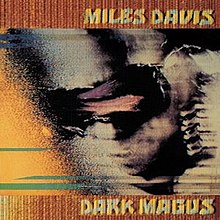Dark Magus
| Dark Magus | ||||
|---|---|---|---|---|
 |
||||
| Live album by Miles Davis | ||||
| Released | 1977 | |||
| Recorded | March 30, 1974 | |||
| Venue | Carnegie Hall in New York City | |||
| Genre | Jazz-rock,funk,free jazz | |||
| Length | 100:58 | |||
| Label | CBS-Sony | |||
| Producer | Teo Macero | |||
| Miles Davis chronology | ||||
|
||||
| Professional ratings | |
|---|---|
| Retrospective reviews | |
| Review scores | |
| Source | Rating |
| AllMusic | |
| Christgau's Consumer Guide | A |
| Down Beat | |
| Encyclopedia of Popular Music | |
| Entertainment Weekly | A |
| Los Angeles Times | |
| MusicHound Jazz | 3.5/5 |
| The Penguin Guide to Jazz | |
| Pitchfork | 9.5/10 |
| The Rolling Stone Album Guide | |
Dark Magus is a live double album by American jazz trumpeter, composer, and bandleader Miles Davis. It was recorded on March 30, 1974, at Carnegie Hall in New York City, during the electric period in the musician's career. Davis' group at the time of the concert included bassist Michael Henderson, drummer Al Foster, percussionist James Mtume, saxophonist Dave Liebman, and guitarists Pete Cosey and Reggie Lucas. He also used the show to audition saxophonist Azar Lawrence and guitarist Dominique Gaumont. Dark Magus was produced by Teo Macero and featured four two-part recordings titled after Swahili names for the numbers one through four.
Dark Magus was released after Davis' 1975 retirement, upon which his label, Columbia Records, issued several albums of various outtakes. After issuing the live recordings Agharta (1975) and Pangaea (1976), Columbia decided that they did not approve of the albums, and Dark Magus was released only in Japan, in 1977 by CBS-Sony. The label's A&R executive Tatsu Nosaki suggested the album's title, which referred to the Magus from the Zoroastrian religion.
Along with Davis' other records during the 1970s, Dark Magus was received ambivalently by contemporary critics, but it inspired noise rock acts during the late 1970s and the experimental funk artists of the 1980s. The album was not released in the United States until July 1997, when it was reissued by Sony Records and Legacy Records. In retrospective reviews, critics praised its jazz-rock aesthetic and the group members' performances, and some believed certain parts foreshadowed jungle music.
...
Wikipedia
